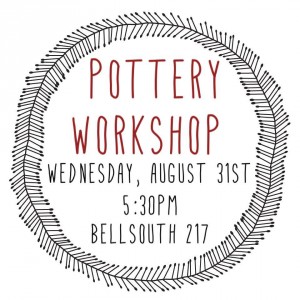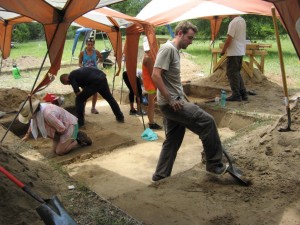Archives For November 30, 1999
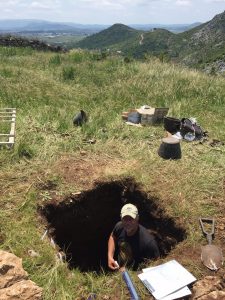 The Archaeology Program is pleased to announce a public lecture by Dr. Michael Galaty, professor and head of Anthropology and Middle Eastern Cultures at Mississippi Sate University.
The Archaeology Program is pleased to announce a public lecture by Dr. Michael Galaty, professor and head of Anthropology and Middle Eastern Cultures at Mississippi Sate University.
“From Plain to Plateau: The Origin of Social Complexity in Northern Albania”. Friday, March 24, 4:00 in Simons 309.
Research in northern Albania is shedding light upon the origins of social complexity, in particular upon the role of inter-regional interaction. Research conducted in the Albanian Alps, the Shkodra plain, and planned investigations on the Dukagjin Plateau in Kosovo highlight the role of interactions between groups inhabiting different ecological zones within the processes of complex social development and the negotiation of identity over the course of human history. Data generated by these various projects inform models of social complexity elsewhere in Europe, and elsewhere in the world.
Dr. Galaty is a former academic trustee of the Archaeological Institute of America, the author of dozens of seminal books and articles on emergent social systems, and recipient of significant grants and awards for his teaching and research.
Sponsored by the Archaeology Club, the Program in Archaeology, the Department of Classics, and the South Carolina Society of the Archaeological Institute of America.
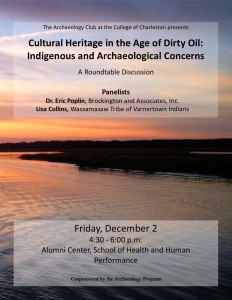 The Archaeology Club and Archaeology Program are pleased to announce an upcoming roundtable discussion:
The Archaeology Club and Archaeology Program are pleased to announce an upcoming roundtable discussion:
Friday, December 2, 4:30 – 6:00, EHHP Alumni Center.
“Cultural Heritage in the Age of Dirty Oil: Indigenous and Archaeological Concerns”. Free and open to the public.
Recent events in the Dakotas highlight the delicate balance between the desires for development and the needs for cultural and environmental protection. Often viewed as diametrically opposed forces, this need not always be the case. The evening’s discussion will focus upon recent conflicts in environmental and cultural heritage management as a way to see if and how greater dialogue and procedural reform can create a system built upon a shared notion of sustainable development.
Panelists will feature:
Dr. Eric Poplin, an archaeologist in Cultural Resource Management from Brockington and Associates,
Ms. Lisa Collins, the tribal administrator from the Wassamasaw Tribe of Varnertown Indians
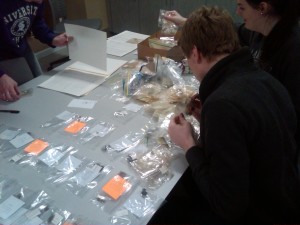 Dr. Allison Sterrett-Krause has been working with students in processing the glass artifacts from Roman Carthage for the past several years, and is continuing this work this year. She will host an introductory session this Friday from 2:30-4:30 in BELL 217.
Dr. Allison Sterrett-Krause has been working with students in processing the glass artifacts from Roman Carthage for the past several years, and is continuing this work this year. She will host an introductory session this Friday from 2:30-4:30 in BELL 217.
Meeting on Friday afternoons during the semester, volunteers are trained to catalogue and draw Roman glass fragments and asked to devote at least 12-15 hours over the course of the semester to our project. The team’s research goal is the eventual publication of late Roman and early Byzantine glass fragments from the Circus in Carthage.
This is an exciting opportunity to learn the basics of artifact analysis from a recognized expert in the field, in one of (if not the only) spaces in the country that holds ‘live’ unpublished glass artifacts from an archaeological project in the Mediterranean. In most cases, the artifacts stay in the country of origin, requiring extensive costs in travel for limited amounts of exposure to the material. In the case of the Roman glass assemblages from Carthage, the material has been legally exported, and are a 10-minute walk down the street. The unparalleled nature of this opportunity is palpable – both in terms of the thoroughness of the analysis and the opportunities for student training and high impact learning.
For more information, contact Dr. Allison Sterrett-Krause directly (sterrettkrauseae@cofc.edu). Owing to demand, working on the glass assemblages is currently limited to enrolled College of Charleston students, although visitors are welcome.
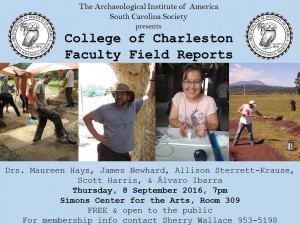 For archaeologists at CofC, the summer is time for exploration via fieldwork and in-depth study. In partnership with the South Carolina Society of the Archaeological Institute of America, we present a series of short reports from the field by Drs. Harris, Hays, Ibarra, Newhard, and Sterrett-Krause. Come to hear what new and exciting work is happening!
For archaeologists at CofC, the summer is time for exploration via fieldwork and in-depth study. In partnership with the South Carolina Society of the Archaeological Institute of America, we present a series of short reports from the field by Drs. Harris, Hays, Ibarra, Newhard, and Sterrett-Krause. Come to hear what new and exciting work is happening!
Thursday, September 8 at 7:00pm
Simons Center for the Arts, 309
College of Charleston
On August 25, the Charleston Museum will host a book launch and signing for Martha Zierden (Curator at the Charleston Museum) and Elizabeth Reitz (professor of anthropology, University of Georgia) whose book, Charleston: an Archaeology of Life in a Coastal Community, has been recently published.
In addition to being curator at the Charleston Museum, Zierden holds a courtesy appointment in anthropology at the College of Charleston, and is a long-time collaborator/co-director of the College’s Lowcountry field school.
Book Launch and Signing for ‘Charleston: An Archaeology of Life in a Coastal Community’
Congratulations to the Archaeology Class of 2015-16!
Majors:
Jami Baxley
Ella Butler
Micahael Chapman
Victoria Douglas
Carolyn Howle
Rebecca Hudson
Danielle Moase
Sarenna Nath
Matthew Ramsey
Heather Thomas
Jessica Yarborough
Minors:
Craig Garrison
Elena Mpougas
Henry Stocker
Best of luck in all of your future endeavors!
For those interested in getting some archaeological experience and being a member of the research team at Dixie Plantation, Dr. Maureen Hays will be offering ANTH493 Field School in Archaeology (4 credits) in Maymester this year (May 16th to May 31st).
This course fulfills the Anthropology major Research Methods requirement and the Capstone requirement for the Archaeology major/minor.
ANTH202 is the prerequisite (or permission of Instructor). If you have taken ANTH202 students will be able to sign up for the course when summer registration opens. If students have not taken ANTH202 but really want to learn something about archaeology, send Dr. Hays an email requesting permission.
The property is owned by the College of Charleston Foundation and located in Hollywood, SC (about 40 minutes from downtown Charleston). Dixie Plantation has a long occupational history (both historic and prehistoric). Focus this summer will be on the early colonial occupation of the site (1700-1750).
The project is co-directed by Dr. Maureen Hays (College of Charleston) and Dr. Kim Pyszka (Auburn University at Montgomery).
For more detail, please see attached.
The Archae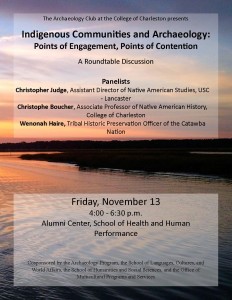 ology Club, as a part of Native American History Month, is sponsoring a roundtable discussion on Friday, November 13 from 4:00 to 6:30 in the Alumni Center of the School of Education, Health, and Human Performance.
ology Club, as a part of Native American History Month, is sponsoring a roundtable discussion on Friday, November 13 from 4:00 to 6:30 in the Alumni Center of the School of Education, Health, and Human Performance.
“Indigenous Communities and Archaeology: Points of Engagement, Points of Contention”
Panelists:
Christopher Judge: University of South Carolina – Lancaster
Christophe Boucher: College of Charleston
Wenonah Haire: Catawba Nation
Cosponsored by the Archaeology Program; the School of Languages, Cultures, and World Affairs; The School of Humanities and Social Sciences; and the Office of Multicultural Programs and Services.
This summer’s field school collected data from several contexts within the Lowcountry. Investigations included soundings at Rose and Hampton Plantations, and historic properties in the urban core of Charleston. See the report from Martha Zierden at the Charleston Museum blog post for more details.




